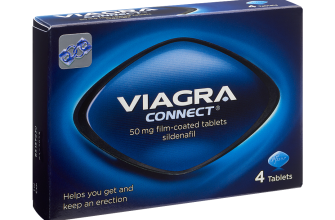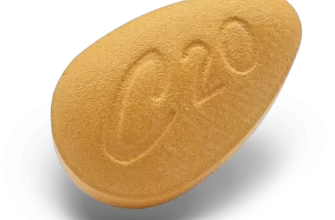Viagra enhances erectile function in men dealing with erectile dysfunction (ED). Its active ingredient, sildenafil, increases blood flow to the penis when sexually stimulated. This mechanism allows for a stronger and longer-lasting erection, making intimate moments more pleasurable.
Medical professionals often recommend Viagra based on individual health assessments. Using it as directed can significantly improve sexual performance, but it’s crucial to consult a healthcare provider before starting treatment. Factors such as existing medical conditions and medications can influence the appropriateness of Viagra.
It’s also important to note the timing of Viagra intake. For optimal results, taking the medication about 30 to 60 minutes before sexual activity is advisable. This window allows sufficient time for the drug to take effect, ensuring you’re ready when the moment arises.
Side effects, while generally mild, can occur. Commonly reported issues include headaches, flushing, and indigestion. Being aware of these can help manage expectations and improve the experience. Always ensure you discuss any concerns with a healthcare professional.
In summary, Viagra serves a significant role in enhancing sexual health for men with ED. By understanding how it works and following medical guidance, men can enjoy renewed intimacy and confidence.
- Understanding Viagra: What It Does
- How It Works
- Potential Side Effects
- How Viagra Works in the Body
- Mechanism of Action
- Pharmacokinetics
- Common Uses of Viagra for Men
- Dosage Recommendations for Viagra
- Potential Side Effects of Using Viagra
- Serious Risks
- Drug Interactions
- Interactions Between Viagra and Other Medications
- Common Drug Interactions
- Special Considerations
- Misconceptions About Viagra Use
- Common Misunderstandings
- Usage Errors
- When to Consult a Doctor Before Taking Viagra
- Alternatives to Viagra for Treating Erectile Dysfunction
- Natural Supplements
- Lifestyle Changes
Understanding Viagra: What It Does
Viagra primarily treats erectile dysfunction by increasing blood flow to the penis during sexual stimulation. The active ingredient, sildenafil, inhibits an enzyme called phosphodiesterase type 5 (PDE5), allowing for better erections. When taken about 30 minutes to an hour before sexual activity, it can enhance the ability to achieve and maintain an erection.
How It Works
Sildenafil relaxes the blood vessels in the penis, which helps fill it with blood. Sexual arousal is still necessary; Viagra does not create an erection without stimulation. The effects can last for up to four hours, although this varies by individual. Timing is key–taking Viagra with a high-fat meal can delay its effects, so it’s best to take it on an empty stomach for quicker results.
Potential Side Effects
Common side effects include headaches, flushing, and nasal congestion. Most side effects are temporary and resolve as the body adjusts. Rarely, more severe effects like sudden vision or hearing loss can occur. Consult a healthcare provider if any adverse symptoms arise, especially if they are persistent or troubling. Always discuss your health conditions and medication history before starting Viagra to ensure it’s a safe option for you.
How Viagra Works in the Body
Viagra operates by enhancing blood flow to the penis, which facilitates an erection when a man is sexually stimulated. The active ingredient, sildenafil, inhibits the enzyme phosphodiesterase type 5 (PDE5). By blocking PDE5, Viagra increases levels of a molecule called cyclic guanosine monophosphate (cGMP), which relaxes smooth muscles and dilates blood vessels.
Mechanism of Action
When a man is aroused, signals from the brain prompt nitric oxide (NO) release, which then stimulates the production of cGMP. Viagra amplifies this response by preventing the breakdown of cGMP. Consequently, relaxed blood vessels allow for increased blood flow, leading to an erection. This process is inherently linked to the presence of sexual stimulation; Viagra does not induce an erection on its own.
Pharmacokinetics
Viagra generally begins to take effect within 30 to 60 minutes after ingestion, although it can work as quickly as 20 minutes for some individuals. Its effects may last for up to four hours. The drug is metabolized in the liver and eliminated primarily through the feces and urine. Factors like age, liver function, and other medications can influence sildenafil’s effectiveness and duration.
| Property | Details |
|---|---|
| Active Ingredient | Sildenafil |
| Mechanism | PDE5 Inhibition |
| Onset of Action | 30-60 minutes |
| Duration | Up to 4 hours |
| Metabolism | Liver |
| Excretion | Feces and Urine |
Common Uses of Viagra for Men
Viagra primarily treats erectile dysfunction (ED) by increasing blood flow to the penis during sexual arousal. This allows men to achieve and maintain an erection suitable for sexual intercourse. Many men find it effective for restoring confidence and improving intimate relationships, enhancing overall quality of life.
In addition to ED, some physicians prescribe Viagra off-label for conditions like pulmonary arterial hypertension (PAH). In this context, it helps relax blood vessels in the lungs, improving exercise capacity and reducing symptoms. Men experiencing mild PAH may benefit from this use under medical supervision.
Additionally, Viagra can also play a role in improving results for men undergoing certain treatments for prostate cancer. In these cases, it helps combat erectile dysfunction that may arise due to surgery or radiation therapy, supporting recovery of sexual health.
Men experiencing low libido or sexual performance anxiety may turn to Viagra for temporary relief. It addresses physical components of performance anxiety, allowing individuals to engage more freely in sexual activities without fear of erectile failure.
Always consult with a healthcare provider to ensure proper dosage and safety considerations based on personal health conditions. It’s essential to avoid self-diagnosing or using Viagra without a prescription to achieve the best outcomes.
Dosage Recommendations for Viagra
The typical starting dose for Viagra is 50 mg, taken approximately 30 to 60 minutes before sexual activity. Adjustments can be made based on individual response and tolerance.
If 50 mg is insufficient, the dosage may be increased to 100 mg. Conversely, if side effects occur, 25 mg is a suitable option. Do not exceed the maximum recommended dose of 100 mg in a 24-hour period.
Take Viagra on an empty stomach for faster absorption. A high-fat meal can delay its effects. Always consult with a healthcare provider before starting or adjusting your dosage.
Regularly review your response to the medication with your doctor. They can guide you in personalizing your dosage based on efficacy and potential side effects.
Potential Side Effects of Using Viagra
Users of Viagra should be aware of possible side effects. Common reactions may include headaches, flushing, dyspepsia, nasal congestion, dizziness, and visual disturbances such as changes in color perception or increased sensitivity to light. These effects are typically mild and temporary.
Serious Risks
While rare, more significant side effects can occur. A sudden decrease or loss of vision in one or both eyes may happen, as well as sudden hearing loss. If you experience chest pain, an erection lasting more than four hours, or any severe allergic reactions, seek medical attention immediately.
Drug Interactions
Viagra interacts with certain medications, particularly nitrates, which can lead to a dangerous drop in blood pressure. It’s crucial to inform your healthcare provider about all medications you are taking, including over-the-counter drugs and supplements. Regular monitoring can help manage any potential side effects effectively.
Interactions Between Viagra and Other Medications
Mixing Viagra with certain medications can lead to serious health issues. It’s crucial to consult a healthcare provider before combining treatments. Popular medications that interact with Viagra include nitrates, commonly prescribed for chest pain. This combination can lead to a dangerous drop in blood pressure.
Common Drug Interactions
Other medications like alpha-blockers, often used to treat high blood pressure and prostate issues, can also interact with Viagra. The combination might cause orthostatic hypotension, leading to dizziness or fainting. Additionally, some antibiotics and antifungals can increase Viagra’s levels in the body, heightening the risk of side effects. Always disclose current medications to your doctor.
Special Considerations
Certain recreational drugs, particularly those containing nitrates, should be avoided with Viagra. Combining these substances can result in severe cardiovascular complications. Grapefruit juice also interacts with Viagra, potentially amplifying its effects. Monitor your intake of grapefruit while on this medication.
Misconceptions About Viagra Use
Many people believe that Viagra guarantees an erection. However, it does not work like an aphrodisiac. Sexual arousal remains necessary for the medication to be effective.
Common Misunderstandings
- Viagra is only for older men: Younger men may also experience erectile dysfunction due to stress, anxiety, or other health issues.
- Taking Viagra will instantly solve all sexual problems: While it aids in achieving erections, it does not address underlying psychological or health concerns.
- Viagra increases sexual desire: The medication solely facilitates the physiological process of getting an erection and has no impact on libido.
Usage Errors
- Overdosing: Some believe that taking more will enhance the effect, but this increases the risk of side effects.
- Mixing with recreational drugs: Combining Viagra with certain substances can lead to dangerous interactions.
- No need for a prescription: It is essential to consult a healthcare professional to ensure safety and proper usage.
Understanding these misconceptions allows for more informed discussions about sexual health and potential treatments. Always consult a doctor to explore options safely.
When to Consult a Doctor Before Taking Viagra
Consult a healthcare professional before taking Viagra if you have any of the following medical conditions:
- Cardiovascular issues: Heart disease, irregular heartbeat, or a history of heart attack.
- Low blood pressure: If blood pressure is significantly below normal levels.
- Recent stroke: Consult if a stroke occurred within the last six months.
- Liver or kidney disorders: If you have severe liver or kidney dysfunction.
- Vision impairment: Conditions like retinitis pigmentosa may require caution.
- Penile structural abnormalities: Conditions such as Peyronie’s disease or other deformities.
Discuss current medications with your doctor, especially if you take:
- Nitroglycerin or other nitrates
- Alpha-blockers
- Antifungal medications
- HIV protease inhibitors
Seek advice if you experience side effects such as:
- Prolonged erection lasting more than four hours
- Severe dizziness or fainting
- Vision changes, including sudden loss of vision
Schedule a consultation if you have a history of substance abuse or consider it pertinent to mention any psychological conditions affecting sexual health.
If unsure about any health aspects related to your situation, prioritize a discussion with a healthcare provider. This ensures safety and suitability for Viagra use.
Alternatives to Viagra for Treating Erectile Dysfunction
Cialis (tadalafil) provides a longer duration of action, lasting up to 36 hours, making it a popular choice for many. Users appreciate the flexibility it offers in terms of timing, allowing for more spontaneous intimacy.
Levitra (vardenafil) works quickly, typically within 30 minutes, and is effective for up to 5 hours. It’s a suitable option for those who prefer shorter intervals and want to enhance performance without prolonged effects.
Natural Supplements
L-arginine, an amino acid, can improve blood flow and enhance erections. Many find benefits after taking doses of 3 to 6 grams daily. Another option is ginseng, which may boost libido and improve erectile function, with studies suggesting significant improvements in sexual performance.
Lifestyle Changes
Adopting healthier habits can make a noticeable difference. Incorporating regular exercise enhances blood circulation and helps maintain a healthy weight, both of which contribute to better erectile function. Reducing stress through mindfulness techniques can also positively impact sexual performance, leading to improved outcomes without medication.










